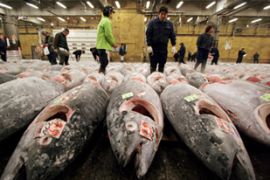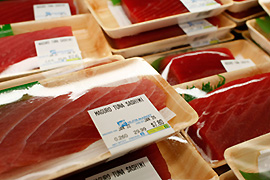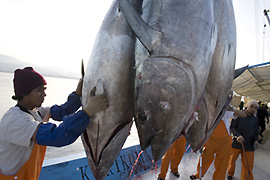Japan criticises bluefin tuna ban
Government raises concerns over proposal to ban global trade of endangered species.

Some 175 member nations of the Convention on International Trade in Endangered Species of Wild Fauna and Flora (CITES), or Washington Convention, will discuss the proposed ban at a March 13-27 meeting in the Qatari capital Doha.
Endangered prize
Global trade in bluefin tuna will be banned if the measure wins support from two-thirds of the member nations.
Raw tuna is a key ingredient in traditional Japanese dishes like sushi and sashimi, and the bluefin variety called “hon-maguro” in Japan is particularly prized.
 |
| Bluefin tuna is a particularly prized ingredient in sushi and sashimi [GALLO/GETTY] |
But global stocks of the bluefin are dwindling, and governments around the world are increasingly supporting a complete trade ban to let the fish recover.
Stocks in the eastern Atlantic and the Mediterranean have dropped 60 per cent from 1997 to 2007, and environmentalists argue that an outright ban is the only solution left to preserve the species.
About 80 per cent of the species ends up in Japan.
Last week Japan’s vice fisheries minister, Masahiko Yamada, said that his country “will inevitably have to take a reservation” if CITES votes for a trade ban this weekend.
Member countries that take a “reservation” would effectively be able to keep trading with other nations that also opt out of the ban.
Quotas ignored
The International Commission on the Conversation of Atlantic Tuna already has quotas cutting the annual catch of Atlantic bluefin by 40 per cent this year to 13,500 tonnes.
But environmentalists say the quotas are widely ignored, and only a ban on trade will allow bluefin tuna stocks to recover.
| Bluefin tuna | ||||||||||||||||
Source: Greenpeace |
The proposal sparked protests at Tokyo’s crowded Tsukiji fish market, the country’s largest, with tuna brokers saying it would unfairly hit the country and its massive tuna market.
About 100 dealers, many dressed in their work clothes, stepped away from their stalls chanting slogans for better use of ocean resources and signed a petition calling for an end to indiscriminate large net fishing.
“This is like telling the US to stop eating beef,” Kimio Amano, a 36-year-old broker who has worked at the market for 20 years, said in reference to the proposed ban.
Japanese tuna industry also fears that a CITES ban of a particular species may make it easier to add other tuna species, like the bigeye and yellowfin, to the list in the future.
“We can’t rule out that the same thing could also happen to the Pacific bluefin, bigeye and yellowfin tuna,” a statement from two major dealers’ co-operatives said.
On Wednesday EU leaders agreed to move a proposal to protect the bluefin tuna – which can fetch $100,000 each at market – have dropped by more than 80 per cent over the last 40 years to around 3.2 million.
The agreement will be formally adopted at a meeting of EU energy ministers in Brussels on Thursday.
Conditional backing
Among the conditions for the EU’s support is a one-year delay to when the ban will take effect, and an opt-out for “artisanal” fishermen using small boats to supply local markets.
 |
| EU governments have backed the proposed ban, with several conditions [Reuters] |
Governments also promised compensation for EU fishermen affected by the possible ban.
EU sources said Malta voted against the proposed ban while Sweden and Austria abstained.
Environmental groups said the EU had not done enough to reduce oversized bluefin tuna fishing fleets, and had even subsidised expansion.
“Over eight years the EU bluefin tuna fishing industry received subsidies totalling €34.5m ($46.8m),” said Markus Knigge of the Pew Environment Group.
“Of this, €33.5 million was for the construction and modernisation of vessels, with only a tiny proportion for decommissioning.”
The group is scheduled to release a report on Friday revealing that 36 French and Spanish vessel owners convicted of illegal fishing activities collected €13.5m ($18.4m) in EU subsidies between 1994 and 2006.